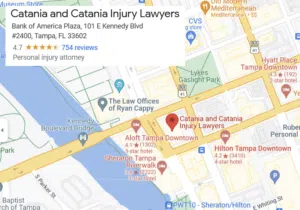
A simple personal injury lawsuit occurs when one party (the plaintiff) sues another (the defendant) for injuries suffered in an accident. However, there are many circumstances when it’s necessary to get an additional third party involved in the lawsuit.
Table of Contents
What is Third-Party Practice?
There are several cases where an existing party forces a new party to join a lawsuit. This is called third-party practice.
The third party’s “joinder” may be voluntary or involuntary. These joined parties include third-party plaintiffs, third-party defendants, intervenors, and interpleaders.
What is an Impleader?
Florida law Florida Civil Rule of Civil Procedure 1.180 governs impleader. This procedure allows the defendant to bring a non-party into the lawsuit when the defendant believes the non-party may be liable for some or all of the plaintiff’s claims against the defendant. In this procedure, the defendant is referred to as “the third-party plaintiff,” and the impleaded party is called the “third-party defendant.”
Assume Phil and Alice go to their neighbor Dan’s house to help move a couch. Phil and Alice lift one end of the couch, and Dan lifts the other. While moving the couch, someone slips, and the couch is dropped. Phil has a broken ankle, and Dan suffers a torn ligament in his knee.
Phil believes Dan is liable for his broken ankle. He is the plaintiff and sues Dan (the defendant) for negligence. However, Dan believes that Alice is at fault, so he impleads Alice, which means that Dan is now a third-party plaintiff and Alice is a third-party defendant.
Other Joinder
Similarly, when the defendant countersues the plaintiff, the plaintiff may bring in a non-party under the same rules as the defendant.
What are Intervenors in Florida Courts?
Florida law Florida Rule of Civil Procedure 1.230 also allows “intervention” into the litigation. This means that a non-party, who was not named in the original lawsuit, petitions the court to join it. This third party is called the “intervenor.”
There are many reasons to intervene in a case. For example, the lawsuit could impact the intervenor’s legal rights or interests, or the result of the litigation could disallow the intervenor from taking their own legal action in the future.
Intervention is not a right – it must be granted by the court. The test for determining whether intervention may be appropriate has been provided by the Florida Supreme Court.
Once a court applies this test and determines that intervention may be appropriate, then it applies the following factors:
- The reasoning underlying the interest
- The size of the interest
- The potential for new conflicts or issues
- Other relevant facts and circumstances.
After weighing these factors, the court decides whether or not to permit the non-party’s intervention as a third party.
What is an Interpleader?
Finally, there is interpleading. This joinder, at Florida Rule of Civil Procedure 1.240, provides that persons “having claims against the plaintiff may be joined as defendants and required to interplead when their claims are such that the plaintiff is or may be exposed to double or multiple liability.”
This commonly happens with insurance. For example, assume that a wife takes out a life insurance policy on her husband. But then the married couple gets divorced, and the former wife remarries. She attempts to change the beneficiary of the life insurance policy to her new husband, but there is an error in her application, and the life insurance company asks her to provide clarification. Before she can, however, she passes away.
Within a week, both the former husband and current husband claim the insurance proceeds. Faced with multiple claimants, the insurance company can file an interpleader action. It deposits the insurance policy proceeds with the court and names the two men as defendants. The court then proceeds to determine the rightful beneficiary, and the insurance company is not exposed to double liability.
How Does Intervenor Work in Federal Courts?
The federal False Claims Act prohibits false statements to the government when supplying the government with goods and services. The law provides a procedure for intervention. Under the Act, an employee who believes they’ve been retaliated against by their employer for disclosing an employer’s violation of the Act may sue the employer for damages.
Sometimes, however, the employee’s allegations involve matters that interest the federal government. For example, the employee’s disclosure may have involved the employer allegedly defrauding the government of millions of dollars. In this case, federal law allows the intervention. The government assumes control of the prosecution of the litigation, but the employee remains a party and remains entitled to damages in the event the employer is found liable.
Contact a Tampa Personal Injury Attorney For Help
Third-party practice in Florida is complex and made more difficult by legal terms such as impleader, intervenor, and interpleader. If you have questions, contact our Tampa personal injury office at Catania and Catania Injury Lawyers, or call us at (813) 222-8656 to discuss your case.




